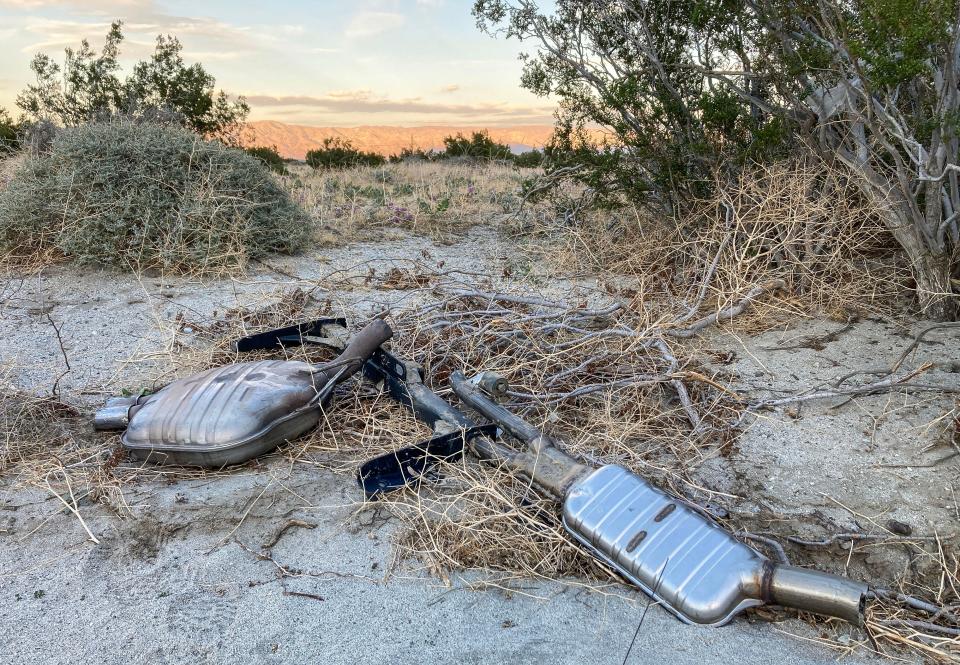More Coachella Valley cities crack down on catalytic converter thefts
Catalytic converter thefts often take a matter of seconds, but can leave car owners on the hook for thousands of dollars in repairs. Following a major uptick in such thefts in recent years, several Coachella Valley cities have recently adopted laws aiming to give local police and sheriff's deputies more tools to arrest suspected thieves.
The number of catalytic converter thefts exploded during the COVID-19 pandemic: From 2019 to 2022, State Farm reported a 1,700% increase in its claims for such thefts nationwide, with California seeing the most of any state. Catalytic converters, part of a car’s exhaust system, contain rare metals that can be resold for hundreds of dollars at scrap yards.
Sheriff’s deputies and police departments across Riverside County have reported similar trends, though both locally and nationally, the number of thefts in 2023 dipped following a surge over the prior three years.
Five city councils across the Coachella Valley — Rancho Mirage, Indian Wells, Palm Desert, La Quinta and Indio — have approved local ordinances this year aiming to curb the thefts. The local laws, which require anyone in possession of a catalytic converter not attached to a vehicle to have proof they own it, follow similar ones adopted in Desert Hot Springs in 2022, followed by Palm Springs and Cathedral City in 2023.
Riverside County also passed an ordinance that applies in its unincorporated areas last year, but the county sheriff’s department has been asking cities to follow suit and avoid a patchwork of different rules across the county’s 28 cities.

The city of Coachella is the only one in the valley that has yet to introduce an ordinance mirroring the county-level law, though a city spokesperson told The Desert Sun that the city’s public safety subcommittee is expected to discuss the issue during its June 27 meeting.
The state has also taken action, with Gov. Gavin Newsom signing three new state laws in 2022 aimed at addressing the thefts. But local law enforcement agencies have continued to push for tighter restrictions that give them more latitude to make arrests.
In the valley, the number of stolen catalytic converters appears to have peaked in 2022: That year, the city of Palm Desert saw 160 reported thefts, while there were 51 in La Quinta, according to Riverside County Sheriff’s Department data. Indio also saw high activity in 2022, with 107 reported thefts, mainly in industrial areas near Interstate 10, and two people were arrested in connection to those cases.
In 2023, those numbers dropped to 67 in Palm Desert, 38 in La Quinta and 67 in Indio, where the police department also made six arrests related to the stolen parts. As of May 2024, only one theft had been reported in Indio this year.
While the frequency of reported thefts has subsided, the costs to victims remain “pretty astronomical” — up to $3,000 to replace the catalytic converter, Riverside County Sheriff’s Department Lt. Frank Velasco told the La Quinta City Council last week.
“(The thefts) are occurring at night, they take 30 seconds underneath the car with saws at the exhaust pipes,” Velasco said. “The victim doesn't realize they're missing their catalytic converter until they start the car up in the morning. By that time, anywhere from six to eight to 12 hours have elapsed, which creates a burden and a problem for law enforcement to actually start the investigation.”
Velasco also noted “loopholes” in state law that add to the challenges, as police typically can’t seize an unattached converter unless a victim of the theft has been identified.
While California lawmakers approved a bill last year making it illegal to possess nine or more detached catalytic converters without a valid permit, the local laws criminalize the possession of just one detached catalytic converter without proof of ownership. Under Palm Desert's ordinance, a person could be jailed for up six months, fined up to $1,000 or both.
While the number of thefts has declined, the crime gained renewed attention in May, when “General Hospital” actor Johnny Wactor was fatally shot after encountering three suspects attempting to steal a catalytic converter from his car in downtown Los Angeles. (While the crimes are more common at night, Velasco noted a theft at the Palm Desert Country Club last month that occurred in the daytime.)
“(The thefts) are not going away, and as far as the future trends, it's kind of hard to see, just because cars in general are changing pretty radically,” Velasco said.
He noted the importance of getting the rules in place across the Coachella Valley to allow for “seamless” enforcement regionally, particularly on high-traffic roads such as Highway 111 that run through several cities.

Daryl Terrell, a Moreno Valley resident, has helped lead the charge in pushing Riverside County’s cities to adopt the stricter laws. After pushing for the county-level law, Terrell has spoken at council meetings for across the valley urging them to follow suit.
“We call (this ordinance) the ‘one and done,’ but ... with the state, we call it ‘eight and you skate,’ because of the fact that state law allows you to take eight catalytic converters if you're without a permit,” Terrell told the La Quinta council. “In Riverside County, we can show the people in Sacramento how we hold people accountable.”
Tom Coulter covers the cities of Palm Desert, La Quinta, Indian Wells and Rancho Mirage. Reach him at thomas.coulter@desertsun.com.
This article originally appeared on Palm Springs Desert Sun: More Coachella Valley cities crack down on catalytic converter thefts

